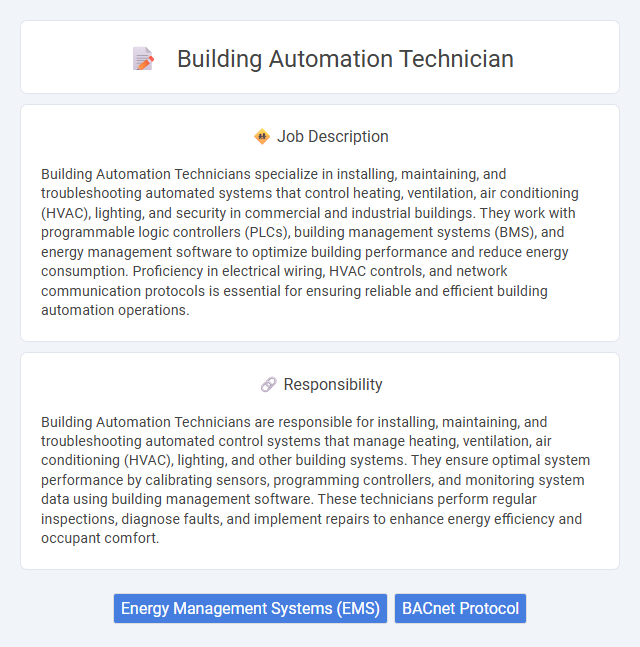
Building Automation Technicians specialize in installing, maintaining, and troubleshooting automated systems that control heating, ventilation, air conditioning (HVAC), lighting, and security in commercial and industrial buildings. They work with programmable logic controllers (PLCs), building management systems (BMS), and energy management software to optimize building performance and reduce energy consumption. Proficiency in electrical wiring, HVAC controls, and network communication protocols is essential for ensuring reliable and efficient building automation operations.
People with strong problem-solving skills and an interest in technology will likely be suitable for a Building Automation Technician role. Those who prefer hands-on work and enjoy troubleshooting complex systems may find this job rewarding and engaging. However, individuals uncomfortable with electrical components or detailed technical tasks might face challenges in this career.
Qualification
Building Automation Technicians require a strong background in electrical engineering, HVAC systems, and computer networking to effectively design, install, and maintain automated control systems. Proficiency in programming languages such as BACnet, LonWorks, and Modbus, combined with certification in HVAC controls or building automation (e.g., NATE or BAA), significantly enhances job performance. Hands-on experience with system integration, troubleshooting, and adherence to industry standards like ASHRAE is essential for optimal building efficiency and energy management.
Responsibility
Building Automation Technicians are responsible for installing, maintaining, and troubleshooting automated control systems that manage heating, ventilation, air conditioning (HVAC), lighting, and other building systems. They ensure optimal system performance by calibrating sensors, programming controllers, and monitoring system data using building management software. These technicians perform regular inspections, diagnose faults, and implement repairs to enhance energy efficiency and occupant comfort.
Benefit
Building Automation Technicians likely experience increased energy efficiency in managed facilities, which can lead to cost savings and environmental benefits. They probably enjoy opportunities for professional growth due to the integration of advanced technologies and systems. Job stability and competitive salaries are also possible advantages within this in-demand technical field.
Challenge
Building Automation Technicians probably face complex challenges in diagnosing and troubleshooting integrated control systems within commercial and industrial environments. The job likely demands adapting to rapidly evolving technology, such as IoT devices and advanced HVAC controls, which means continuous learning is essential. Managing unexpected system failures and ensuring minimal downtime could be a frequent and critical aspect of the role.
Career Advancement
Building Automation Technicians specialize in installing, maintaining, and troubleshooting automated control systems in commercial and industrial buildings to optimize energy efficiency and system performance. Career advancement opportunities include progressing to senior technician roles, automation project manager, or systems engineer positions, with potential to specialize in cutting-edge technologies like IoT integration and smart building systems. Gaining certifications such as the BACnet Professional or Certified Energy Manager (CEM) enhances career growth and increases earning potential within this rapidly evolving industry.
Key Terms
Energy Management Systems (EMS)
Building Automation Technicians specializing in Energy Management Systems (EMS) install, program, and maintain advanced control systems that optimize energy consumption in commercial and industrial facilities. These technicians use software tools to monitor HVAC, lighting, and other building systems to enhance efficiency, reduce utility costs, and ensure compliance with energy standards such as LEED and ASHRAE. Expertise in EMS technologies, including BACnet and Modbus protocols, is crucial for integrating diverse building components into a unified automated platform.
BACnet Protocol
A Building Automation Technician specializes in installing, programming, and maintaining building management systems that utilize the BACnet protocol for seamless communication between HVAC, lighting, and security devices. Proficiency in BACnet enables efficient integration, troubleshooting, and optimization of building automation components to ensure energy efficiency and occupant comfort. Expertise in BACnet/IP and BACnet MSTP networks is essential for configuring controllers, sensors, and gateways within complex commercial and industrial environments.
 kuljobs.com
kuljobs.com